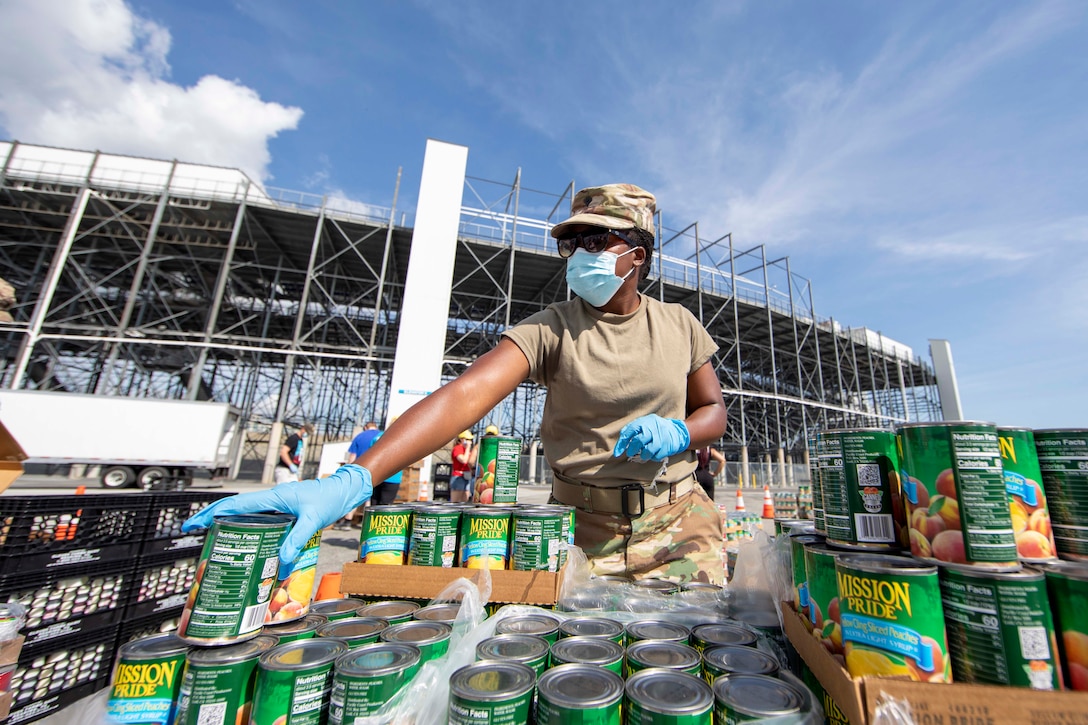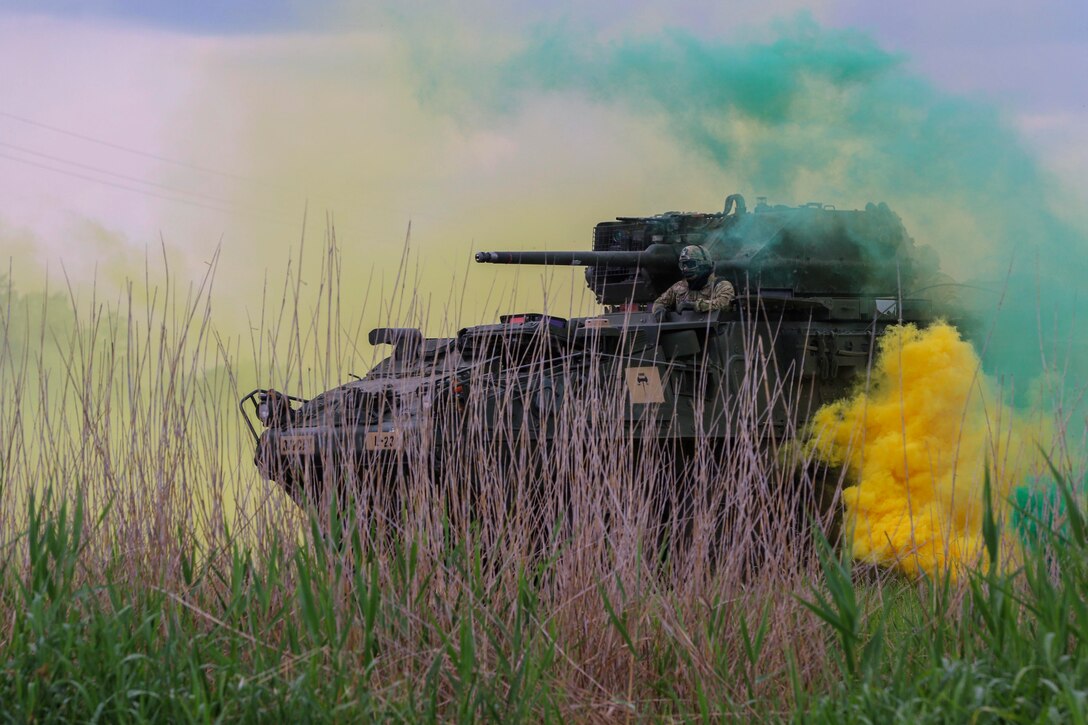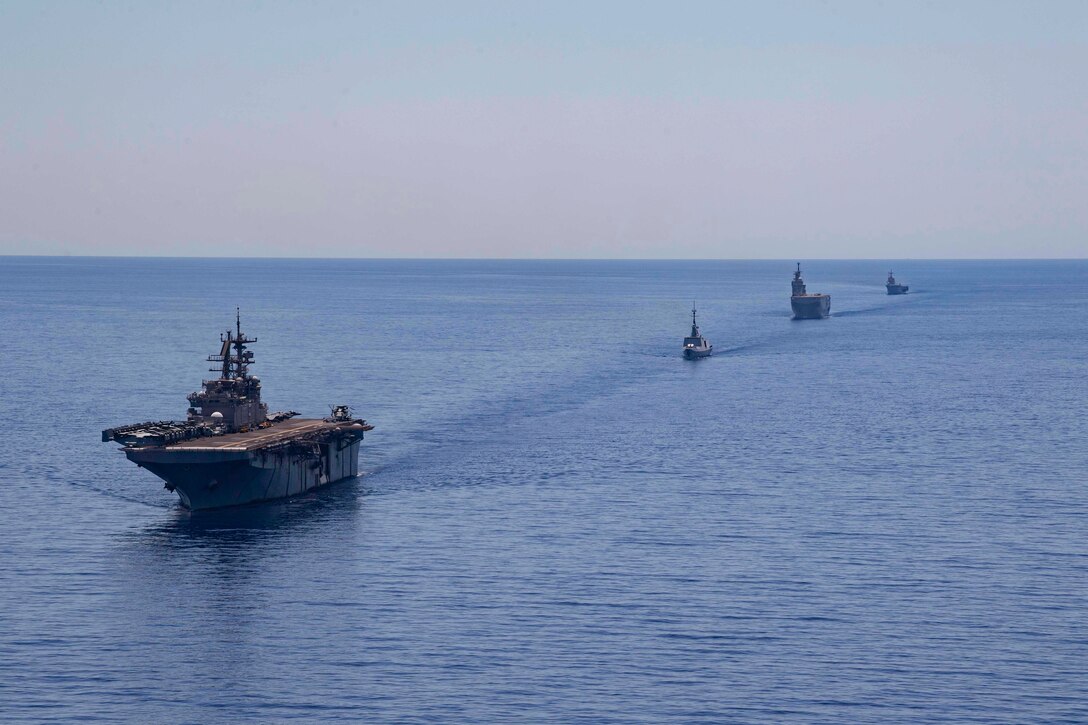Delaware Army National Guardsman Spc. Ashley Jacobs organizes canned goods during a drive-thru food pantry on the grounds of the Dover International Speedway, Dover, Del., June 24, 2020. About 25 guardsmen joined volunteers with the Food Bank of Delaware to distribute items to address the increased demand for food assistance amid COVID-19.
Thursday, June 25, 2020
Bull Run
Soldiers ride in a Stryker infantry carrier vehicle near Jaglowo, Poland, June 22, 2020, during Bull Run 12, an exercise that tests readiness and interoperability.
In Formation
The amphibious assault ship USS Bataan sails in formation ahead of the French frigate FS Guepratte and amphibious assault ship FS Mistral, and the Italian amphibious transport dock ship ITS San Giorgio during a maritime training exercise in the Mediterranean Sea, June 24, 2020.
Returning to Normal Operations on the Pentagon Reservation: Phase Two
DOD Chief Management Officer Lisa Hershman has approved the transition to Phase Two of the Pentagon Reservation Resilience Plan, which will move the Pentagon Reservation to Health Condition Bravo effective 5 a.m. EDT, Monday, June 29, 2020. Both Armed Forces Retirement Home campuses, in Washington, D.C, and Gulfport, Mississippi, will remain at Health Protection Condition Delta, the highest level of protection, due to the vulnerable residents and healthcare workers at our retirement homes.
The Secretary of Defense's number one priority during the COVID-19 pandemic is protecting our workforce. The decision to move to Phase Two took into account health data provided by state, district and local governments in the National Capital Region, as well as nearby military installations. The decision was based on:
- No evidence of disease rebounding in the NCR.
- 14-day downward trajectory of influenza-like illness and COVID-like symptoms within a 50-mile radius of the Pentagon.
- 14-day downward trajectory in COVID cases and positive test results in the general population.
- Adequate health care and robust testing capabilities in state and local health care systems and military medical treatment facilities within a 50-mile radius.
- Mandatory stay-at-home orders within a 50-mile radius of the Pentagon are lifted.
- Sufficient cleaning, disinfectants, and hygiene supplies are available.
Main differences that may be seen starting Monday are a greater increase of people in workspaces, more open concessions, and the reopening of the Corridor 9 pedestrian bridge pedestrian booth (Connector/Press Lot). Detailed information about Phase Two may be found at www.whs.mil/Re-entry/ and the posted Workplace Re-Entry Guide During COVID-19.
Key facets of the plan for Phase Two include:
- Phase Two specifies supervisor-planned cohort or alternating schedules with no more than 80% of mission and non-mission essential employees in the office space. Telework at 20% or more is encouraged, especially for vulnerable populations.
- Cloth face coverings are mandatory on the Pentagon Reservation where you cannot maintain 6 feet of social distancing. Gatherings are limited to fewer than 50 people with adequate social distancing.
- Employees should take their temperatures before reporting for work each day. Employees should stay at home for 3 days and notify their supervisor if they have a 100.4 degrees Fahrenheit or higher temperature or are experiencing COVID-like symptoms, including loss of sense of taste or smell.
- Personnel entering a DoD-managed office building will notice random temperature and question screening in place to protect the workforce.
- Parking exceptions for COVID-19 are still in place. General
parking for COVID-19 Temporary Parking Clearances is based on a “first
come, first served” basis. If parking spaces become full, overflow
parking is available at the Mark Center North Parking garage. Permit
holders should park in their designated areas. Please check www.whs.mil/Re-entry for the most recent Building Circular or the COVID-19 Parking Plan for details.
OVID-19 Lab Technicians: Unsung Heroes During Pandemic
Joint Base San Antonio-Fort Sam Houston is home to the busiest military hospital in the United States, Brooke Army Medical Center, where lab technicians have processed more than 10,000 COVID-19 tests.
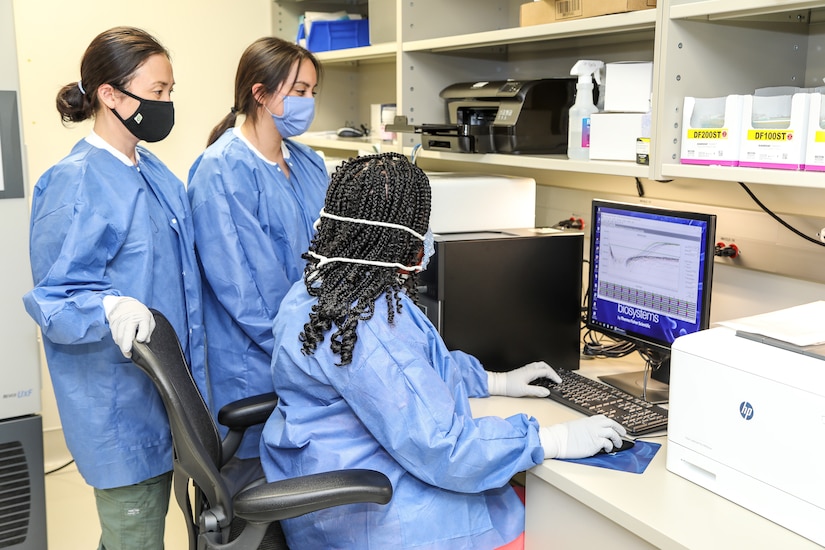
As one can imagine with a hospital as large as BAMC, COVID-19 has spurred a change in normal operations in various areas. Nurses and doctors all over the world are doing a phenomenal job day in and day out, but the role of lab technicians can easily be overlooked
Though they may not be on the front line testing or caring for patients face to face, they have been working diligently in recent months, aiding the fight against the novel coronavirus.
"Since COVID started, we have added additional personnel to help with the large mission requirements that COVID has presented us," said Army Capt. Eric Coate, chief of Molecular Diagnostics and Immunology at BAMC.
Leslie Contreras, medical technologist, said routine tests have decreased in number, while COVID testing has become the main focus. "Some tests have been put on a hold and are being sent to a reference lab to accommodate the priority of COVID," Contreras added.
Coate said although the lab's hours are 5 a.m. to 10 p.m., the lab techs often run testing for 24 hours, when the number of samples collected necessitates around-the-clock operations. The workers wear the proper mandated personal protective equipment when working, which consists of a lab coat and gloves in their Biosafety Level 2 lab environment.
The section that tests for COVID-19 is led by Army Lt. Col. Robert Cybulski, Jr. and supervised by Marisa Fernandez. Cybulski recognizes the help the lab has received in their efforts to combat the virus. "Aside from our teammates within the Department of Pathology, we collaborate with the staff that is running the BAMC testing and screening operations, the staff of the Infectious Disease Service, and the staff of the Preventive Medicine Department," he said. "We have benefited from support provided by separate commands located on Fort Sam Houston [Public Health Laboratory] and retired Army officers who have been reactivated to support the COVID-19 response."
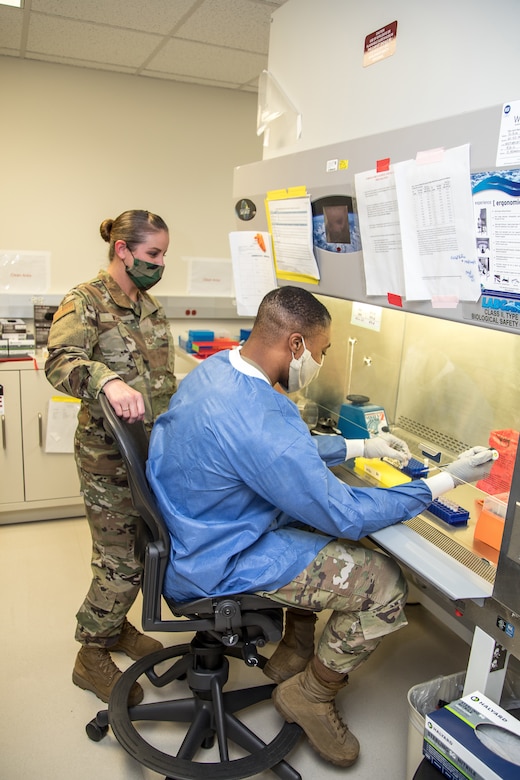
Along with these departments, the Wilford Hall Ambulatory Surgical Center and Food Analysis and Diagnostics Laboratory technicians have volunteered their time and resources to assist the ongoing COVID-19 mission at BAMC. All of this assistance has aided the lab in conducting so many COVID-19 tests while still maintaining focus on their regular mission.
So what happens when a test comes back positive?
"Immediately after a positive result is generated in the lab and reviewed at the appropriate level, the results are reported to senior leadership in the hospital," Cybulski said. "Immediately after that, they are passed to a group of infectious disease physicians for appropriate clinical follow up."
"On a daily basis, the total list of positives generated during that time period is sent to infectious disease, as well as the Public Health personnel on Fort Sam Houston and Lackland Air Force Base, and select physicians within BAMC Family Medicine, to ensure that patient follow-up is completed and documented appropriately, and to facilitate additional reporting on the Public Health side," he said.
This chain of events allows for safe and proper acknowledgement for those infected to seek treatment and be able to quarantine, along with an effective follow-up of patients.
Air Force Lt. Col. Carolann Miller, laboratory manager, said she believes that at the beginning of the pandemic, there was increased anxiety due to the fear of the unknown as this is a new virus. However, over time and with proper guidance like wearing face masks, social distancing and the adjustment of work schedules, the anxiety has somewhat subsided, she said, while stressing the importance of ongoing vigilance.
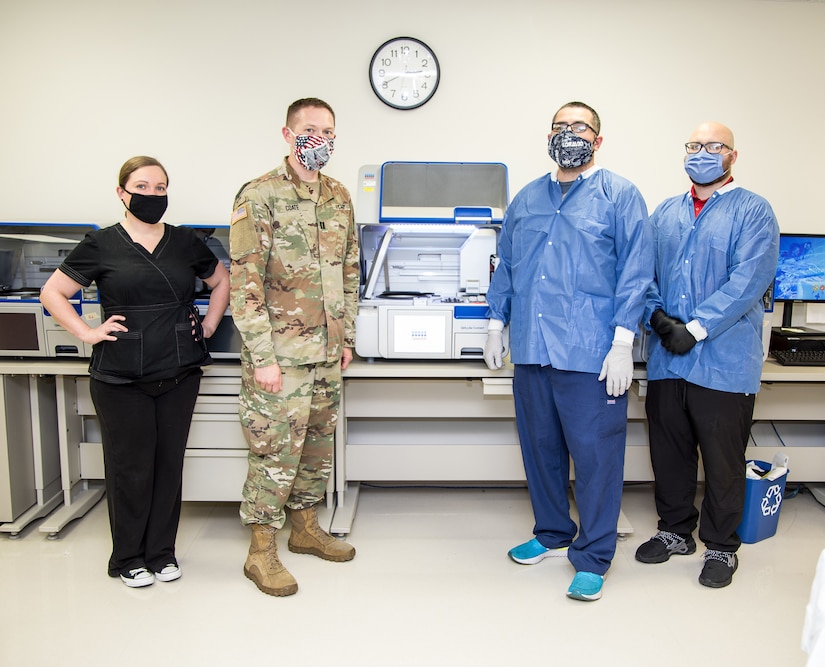
"The lab's biggest impact on COVID-19 is laboratory and molecular section leadership being 100% engaged from the beginning and getting the testing for this virus in-house as soon as possible to serve our beneficiary population in the [Joint Base San Antonio] area," Miller said.
Air Force Col. Samantha Butler-Garcia, chief of the Department of Pathology and Area Laboratory Services, revealed that her favorite part about coming to work is providing safe and high quality health care for active duty and veteran personnel. "They have made sacrifices for their country in ways that are often unimaginable, so they deserve the best health care," she said.
The laboratory has shown amazing resilience as it has adapted to the evolutionary changes that have come from the [Centers for Disease Control, and Prevention, the Defense Department and other agencies regarding the understanding of COVID-19, said Army Master Sgt. Jeffrey Thomas, noncommissioned officer in charge of the Department of Pathology and Area Laboratory Services. The staff has shown a level of teamwork and camaraderie that he has experienced only under the most high-stress environments, he added.
"Civilians and military members from other sections of our laboratory and exterior DOD organizations with laboratorians stepping forward to be a part of the testing teams to assist us is a thing of true professional harmony," Thomas said.
(Zaria Oates is assigned to Brooke Army Medical Center.)
Kirtland Senior NCOs Coordinate Community Outreach During COVID-19
Senior noncommissioned officers and other airmen at Kirtland Air Force Base, New Mexico, participated in a community outreach event at the Roadrunner Food Bank to help local people affected by the COVID-19 pandemic.
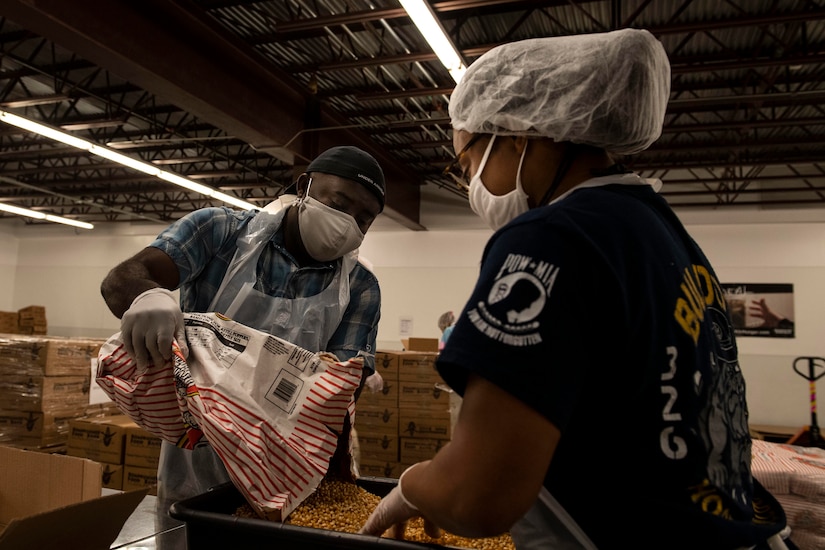
The base's senior enlisted association, which calls itself TKT3 — short for Team Kirtland Top 3 — has been volunteering at Albuquerque food bank for almost two years. This June 19 event had 80 volunteers putting in 160 work hours across three shifts.
"The purpose of the event is to bring Team Kirtland together to show unity and support for our local community," Air Force Master Sgt. Matthew L. Coburn, munitions systems program manager for the Air Force Operational Test and Evaluation Center and TKT3 member, said. "By volunteering with Roadrunner Food Bank, Team Kirtland is able to provide critical support in this extremely vital time of need within the local community."
TKT3, composed of members of the top three enlisted ranks — master sergeant, senior master sergeant and chief master sergeant — participates in various events quarterly that allow airmen across the base to enhance their professional development while supporting the local community.
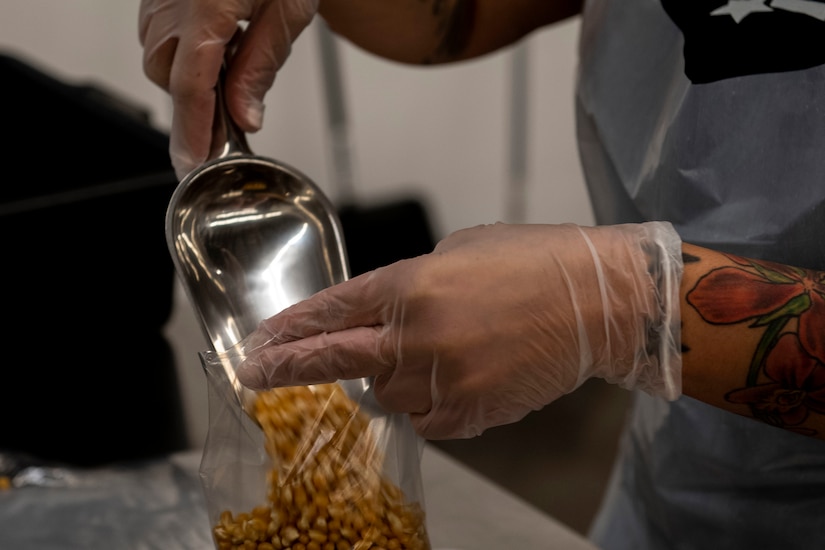
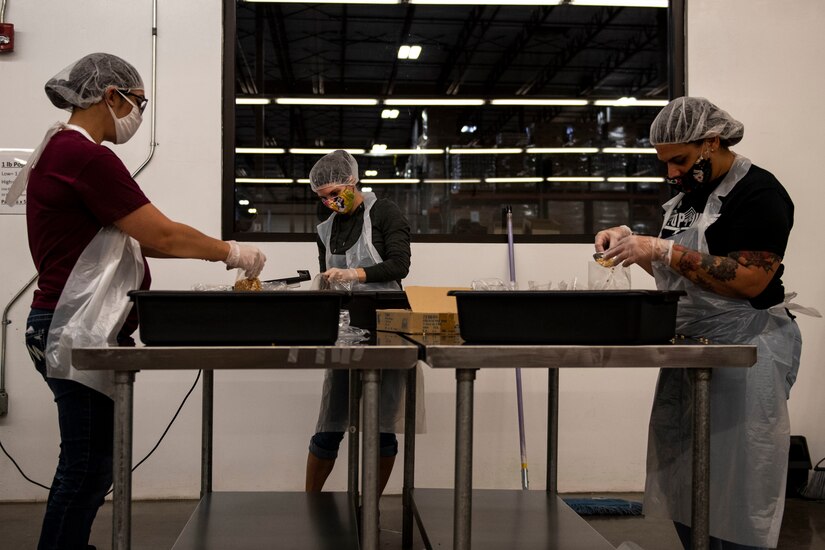
Volunteer activities for this event included packaging food for delivery to local churches, schools, food pantries and more. Those duties involved sorting through fresh produce, bagging popcorn and providing support as needed in the factory.
"It feels good to help out," Air Force Staff Sgt. Sydney Y. Hulme, aircrew flight equipment journeyman with the 58th Operations Support Squadron, said. "It really shows the community that Team Kirtland is here for them and can give a helping hand when needed."
Texas National Guard Medics Conduct COVID-19 Antibody Testing
Service members who have taken part in Operation Guardian Support were tested for COVID-19 antibodies at the Weslaco Armory in Weslaco, Texas.
Operation Guardian Support medics, along with medics assigned to the Texas National Guard's COVID-19 Preparedness and Response Team, conducted the tests June 19.
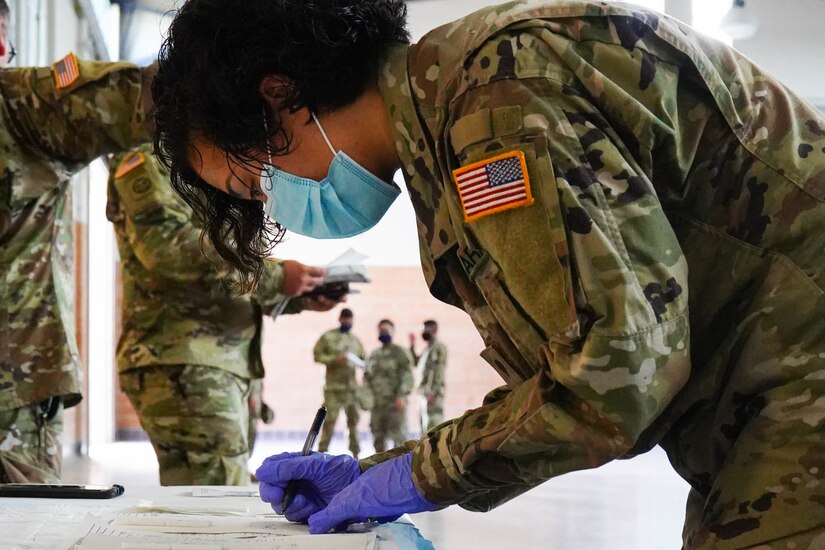
Testing was conducted for service members with symptoms, potential symptoms or known exposure to someone being tested for COVID-19, officials said.
"Today we had roughly 30 service members who were waiting for COVID-19 testing out in the local facilities," Army Maj. Vicente Bautista said. "We had testing available, so we went ahead and did the testing ourselves. What we did was antibody testing, which gave us results in about 15 minutes."
The medics use the tests to track exposure, symptoms and personal data for record.
"The test itself is a finger prick with a lancet," Army Spc. Joshua Leonard, with the COVID-19 Preparedness and Response Team, said. "It just needs a few drops of blood from the fingertip. That is then placed into a prepared testing card. The blood is then mixed with a serum designed for this test. The two mix, and the reaction will show a line on the test if the antibodies are present."
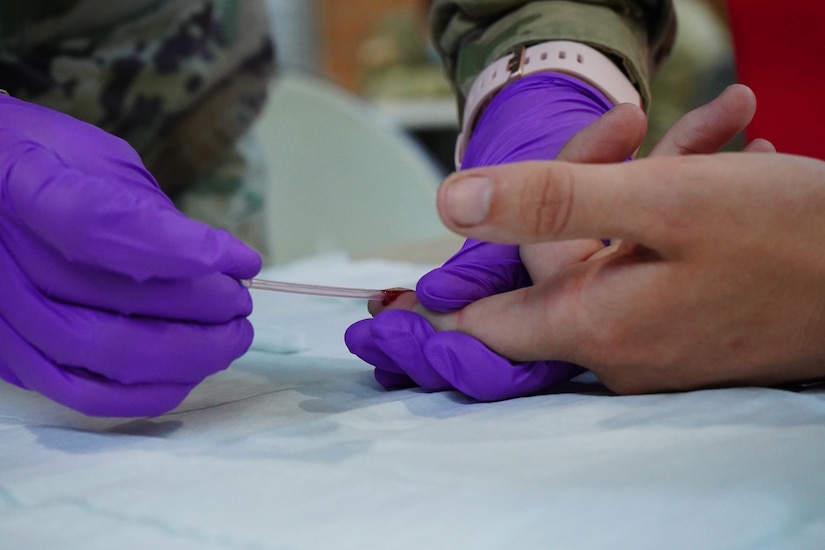
Once service members have completed their test, they wait 15 minutes for the results. They then speak with the Task Force physician assistant to discuss the results and get further instruction based on the results.
Should a service member's test results show positive, Leonard said, it does not necessarily mean they will be ill with COVID-19. It means they have been exposed to the virus and their body has formed a defense against it, he explained.
(Air Force Staff Sgt. DeJon Williams is assigned to the Texas Air National Guard.)
